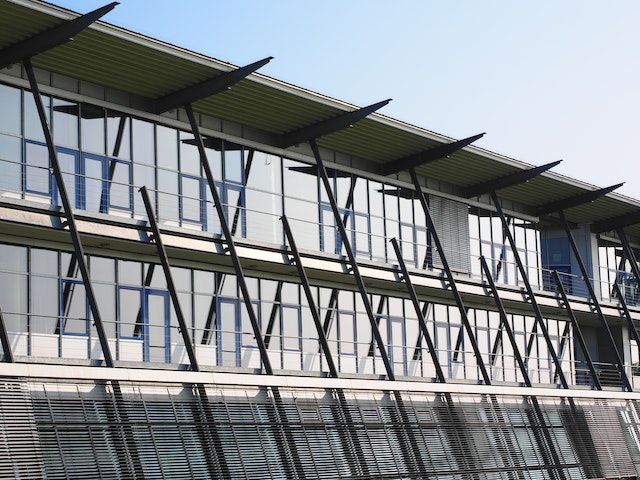Table of Contents
ToggleThe solar energy market is shifting as new technologies become widely available. One of these is glass solar panels, which don’t need a lot of land area. In addition, they combine good looks with efficiency, making them aesthetically pleasing.


What are glass solar panels?
Solar glass, or photovoltaic (PV) glass, is a technology that turns sunlight into electricity. This is possible by integrating transparent semiconductors into two glass pieces, allowing some light through while converting sunlight into electricity. They are also called semi-transparent solar cells.
Glass solar panels also help keep interiors cooler by blocking out heat. These translucent panels can generate electricity for offices, homes, automobiles, or even smartphones.
How does solar glass work?
The glass window containing semi-transparent semiconductors absorbs infrared and ultraviolet (UV) radiation when the sun’s rays land on it. Absorbed sunlight is then converted into electrons. These electrons can move from one medium to another by passing through a surface. Hence, they are fed to the system, which converts solar energy into electrical energy.
Solar windows benefit large towers and skyscrapers with insufficient roof space to mount solar panels. These energy-generating windows are sometimes sufficient to power all the building’s electricity usage.
For more on how solar panels work, read “How do solar cells work?”
Does solar glass keep heat in?
Solar glass, also known as Solar Control Window Films or Solar Reflective, is coated with a particular substance to reduce heat entering a building. It reflects and absorbs heat to make interiors cooler, reducing the need for air conditioning.
How efficient are glass solar panels?
Solar panels are evaluated at Standard Test Conditions (STC) to assess their efficiency. STC determines a temperature of 25°C and irradiation of 1,000 watts per metre square. It is the equivalent of a sunny day with incident light striking a 37° tilted surface facing the sun.
As a result, a 15% efficiency solar panel with a 1-metre square of total area generates 150 watts under these test conditions. A transparent solar panel is around 1% efficient, potentially going up to 7.2%.
Compared to conventional solar panels’ average efficiency of 15%, efficiencies of 5% and 7.2% for totally and partially transparent panels, respectively, are still relatively low.
How much energy can solar glass produce?
Using this formula, you can calculate how much electricity solar glass produces – watts multiplied by sun hours equals daily watt-hours.
If a 300-watt solar panel receives six hours of daily sunlight, the total power production is 1.8 kilowatts per hour. This simple method makes calculating weekly, monthly, and yearly energy production straightforward.
However, peak sunlight hours may be uncertain depending on where you live and how many daylight hours are in the area. Several solar installation companies provide exposure tables for their service zone. Their expertise should help maximise panel placement.
Likewise, solar panels may produce more or less energy than advertised depending on window angle and weather. So, the amount of electricity a particular glass solar panel can produce varies.
For example, a day school in Denmark named Copenhagen International School is already using transparent solar panels. According to Interesting Engineering, 12,000 “hued but clear” solar panels cover the roof. The building gets more than half of its annual energy needs met by these solar glass windows, which total 200 megawatts per hour.
Thus, depending on how much sunlight enters the cells in each window, daily output can be anywhere from eight to ten watts.
Advantages of solar glass
Renewable solar energy is an efficient way to power your home. The following are some key benefits of fitting glass solar panels on your windows:
- Indoor cooling: Some properties get excessively heated in the summer. Sunlight coming through windows contributes significantly towards this heat. Solar tint glass can keep the interior cooler.
- UV-blocking: UV rays cause significant health risks such as skin cancer. Besides, longer exposure to UV fades furniture.
- Privacy: A one-way privacy window film of solar glass blocks people from seeing through the glass inside your house. However, the glass will allow you to see the outside.
Disadvantages of solar glass
Though solar glass has many beneficial characteristics; the following are some downsides:
- Weather-dependent: Solar panels can only collect energy from the sun during daylight hours. Cloudy, wet days might affect the energy system as there is less sunlight during such weather. As a result, the glass panel cannot absorb the usual amount of heat, leading to less electricity converted.
- High initial expense: Solar windows cost more than double a conventional rooftop solar panel making for a costly initial investment.
Solar glass options
The type of solar glass used to make solar panels affect how well they work and how efficient they are. We outline the types of solar glass and their features.
1. Low-iron solar textured glass
Low-iron solar textured glass has low potential-induced degradation (PID), which increases module output leading to higher transmission. In addition, it lowers the iron content of solar glass by 60 ppm, providing higher chemical durability and hydrolytic resistance to cater to larger modules like 96 cells and standard 72/60 cell modules.
2. Matte-finished solar glass
It is a low-reflective glass designed to minimise reflection losses and maximise the efficiency of solar energy collection. A thin, transparent coating of an anti-reflective material is applied to the surface of the glass to achieve a matte finish.
It decreases the amount of light reflecting off the surface, allowing more light to pass through the glass and be absorbed by the solar cells. This type of glass also helps to reduce glare, making the user’s environment more comfortable.
3. Borosil 2mm fully tempered solar glass
Fully tempered solar glass is 2 mm thick and has lower overall costs. It is stronger, safer, lasts longer and costs less to make. You can use this type of glass on roofs, BIPV safety glass, and cladding.
According to Glasstech news, Brorosil’s 2 mm fully tempered solar glass is lighter than the current world standard of 3.2 mm, making installation easier. It also absorbs less solar energy and lets more light reach the solar cells.
4. Antimony-free solar glass
The Borosil has developed the world’s first antimony-free solar glass. Antimony is often added to the glass in solar panels to protect it from UV rays or radiation exposure.
However, antimony is toxic and causes skin and respiratory problems. It interferes with gastrointestinal functions causing chromosomal damage in leucocytes, which is detrimental to your health.
5. Anti-glare solar glass
It has a textured surface to diffuse reflected light so that bright sunlight does not fall on your eyes directly. Its anti-reflective coating improves light transmittance, increasing the total energy efficiency of the PV module. It is ideal for airport PV installations, as it transmits less light than non-textured glass.
6. Solar glass with anti-reflective coating
Solar glass uses a thin layer of dielectric material as an anti-reflective coating that prevents the reflection of sunlight. This coating makes it harder for heat and glare from the sun to get into a building while letting in natural light.
It improves the efficiency of solar energy systems by increasing the sunlight absorbed by the solar panels. Additionally, it helps protect the glass from scratches, stains, and other damage.
7. Solar glass with an anti-soiling coating
This is a creative solution that helps cut down on dust, moisture, and other things that can affect how much energy a solar module can make. This coating makes cleaning easier.
It also reduces the need for frequent solar panel cleaning cycles and labour costs. Furthermore, the anti-soiling coating also improves the performance and maintenance of solar panels.
Which glass is best for solar panels?
Toughened glass, known as tempered glass, is ideal for solar panels. It is considerably more durable than its non-tempered counterparts.
Additionally, tempered glass breaks into dull cubes instead of sharp pieces, making it safer for individuals in close surroundings. However, it might be harder to clean. Moreover, they need a robust and secure framework to be installed properly.
How to clean solar glass panels?
If the panels are dry, it is recommended that you brush off any loose items before treating the modules with water. It will make cleaning the solar panel glass windows much simpler and faster.
Do not use metal or abrasives to remove caked-on materials. If the glass solar panel is damaged, it will cast shadows and reduce efficiency. In addition, detergents can stain it. Use clean water and a sponge or soft brush to gently rinse the dirt off the panel. You can also use isopropyl alcohol to remove oily spots.
Read “Best Practices To Clean Your Solar Panels” to know more.
Will a cracked glass solar panel still work?
The extent of the cracked glass on a panel determines whether it will work or not. If the damage is only aesthetic, like broken tempered glass or a bent frame, it will work just fine. But because of the broken glass, rain and dirt can get in and damage the electronic parts.
On the other hand, if the wiring within the module itself is damaged, the solar panel’s efficiency might drop substantially. In most situations, it won’t produce any energy, bringing the entire solar system down.
How to fix cracked glass on a solar panel?
If a cracked solar panel only has broken glass and no electrical damage, follow the instruction booklet or contact the manufacturer for advice. Most solar panels have a 10 to 15-year warranty, so they’ll fix it for free.
If there’s no warranty, call a professional repair service that can handle the matter efficiently and offer guidance. Wrapping a cracked solar panel with transparent film is the easiest method to mend it. It isn’t as good as glass, but it will work with minimal effort.
Where can you get glass solar panels?
The top efficient solar panels on the market are rated at 22.8%, while the rest are rated between 16% and 18%. SunPower solar panels are the market’s most efficient. It is the current consumer favourite for efficiency, despite its higher price.
Here are the five best solar panel manufacturers, ranked by the highest-efficiency panels they make:
| COMPANY | EFFICIENCY RATING | TECHNOLOGY For SOLAR CELL |
| SunPower | 22.8% | Monocrystalline |
| REC Solar | 21.7% | Monocrystalline |
| CSUN | 21.2% | Monocrystalline |
| Panasonic | 21.2% | Monocrystalline and amorphous silicon cell |
| LG | 22.0% | Monocrystalline |
Conclusion


Given its benefits, major buildings and skyscrapers are expected to adopt glass solar technology rapidly. In the future, they will become commonplace in urban areas. Solar windows are worth a try if your business is looking for cheaper electricity, a more stable power supply, or a way to switch to renewable energy.
For more information on solar panels, visit our website, Just Solar!





This Post Has One Comment
Thank you for the detailed insights on glass solar panels. The post effectively outlines their benefits and durability. It’s interesting to see how solar technology integrates with building aesthetics. In relation to energy efficiency, how might pairing these panels with residential or commercial window tints impact overall performance and sustainability?